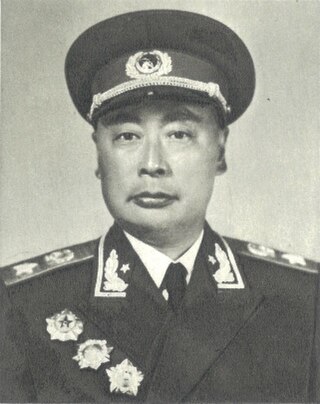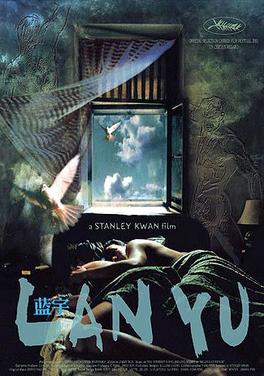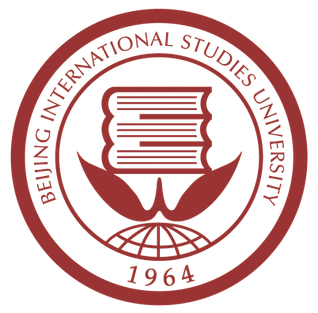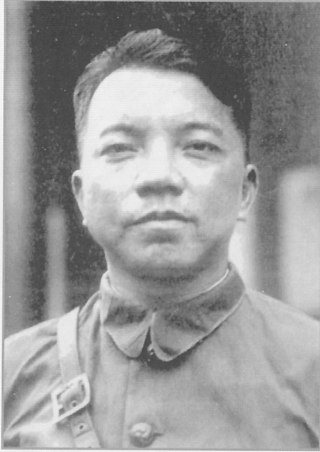
Chen Yi was a Chinese communist military commander and politician. He served as Mayor of Shanghai from 1949 to 1958 and as Foreign Minister of China from 1958 to 1972. He is one of Ten Marshals of the People's Republic of China.

The Sino-Soviet split was the gradual worsening of relations between the People's Republic of China (PRC) and the Union of Soviet Socialist Republics (USSR) during the Cold War. This was primarily caused by doctrinal divergences that arose from their different interpretations and practical applications of Marxism–Leninism, as influenced by their respective geopolitics during the Cold War of 1947–1991. In the late 1950s and early 1960s, Sino-Soviet debates about the interpretation of orthodox Marxism became specific disputes about the Soviet Union's policies of national de-Stalinization and international peaceful coexistence with the Western Bloc, which Chinese leader Mao Zedong decried as revisionism. Against that ideological background, China took a belligerent stance towards the Western world, and publicly rejected the Soviet Union's policy of peaceful coexistence between the Western Bloc and Eastern Bloc. In addition, Beijing resented the Soviet Union's growing ties with India due to factors such as the Sino-Indian border dispute, and Moscow feared that Mao was too nonchalant about the horrors of nuclear warfare.

Li Xiannian was a Chinese Communist military and political leader, president of China from 1983 to 1988 under paramount leader Deng Xiaoping and then chairman of the Chinese People's Political Consultative Conference from 1988 until his death. He was a full member of the Politburo from 1956 to 1987, and of its Standing Committee from 1977 to 1987.

Lan Yu is a 2001 gay-themed Hong Kong-Mainland Chinese film set in Beijing by Hong Kong director Stanley Kwan.

Beijing International Studies University is a municipal public college of foreign languages in Chaoyang, Beijing, China. It is affiliated with the City of Beijing, and co-funded by the Beijing Municipal People's Government and the Ministry of Culture and Tourism.

China is a major chess power, with the women's team winning silver medals at the Olympiad in 2010, 2012, and 2014; the men's team winning gold at the 2014 Olympiad, and the average rating for the country's top ten players third in the FIDE rankings as of April 2023.

The Beijing Exhibition Center was established in 1954 as a comprehensive exhibition venue in Beijing, China. Built in the Sino-Soviet architectural style that was popular in the 1950s, the Beijing Exhibition Center contains three large exhibition halls as well as museums.

Li Jishen or Li Chi-shen was a Chinese military officer and politician, general of the National Revolutionary Army of the Republic of China, Vice President of the People's Republic of China (1949–1954), Vice Chairman of the National People's Congress (1954–1959), Vice Chairman the Chinese People's Political Consultative Conference (1949–1959) and founder and first Chairman of the Revolutionary Committee of the Kuomintang (1948–1959).

Back to 1942 is a 2012 Chinese historical film directed by Feng Xiaogang. It is based on Liu Zhenyun's novel Remembering 1942, and is about a major famine in Henan, China, during the Second Sino-Japanese War. On 11 November 2012, the film premiered at the International Rome Film Festival. The film was selected as the Chinese entry for the Best Foreign Language Film at the 86th Academy Awards, but was not nominated.

Liu Zihou was a Communist revolutionary leader and politician of the People's Republic of China. He served as Governor of Hubei and Hebei provinces, and as the top leader of Hebei during the Cultural Revolution, but was ousted from his positions after he opposed the reforms of Deng Xiaoping. He was a protégé of Li Xiannian, one of China's top leaders.
The Translators Association of China (TAC) is a national association for translation studies in China. Founded in the 1980s TAC was part of the academic response to the national Economic Reform in 1978. The incumbent President of TAC's 6th Executive Committee is the former Chinese Foreign Minister Li Zhaoxing, who in the meantime chairs the Foreign Affairs Committee of China.
Li Wenjun was a Chinese translator and writer of prose. Li served as the vice chairman of Translators Association of China and as the director of the Literature and Art Translation Committee. He was also a researcher at the Chinese Academy of Social Sciences.
Gao Mang also known by his pen name Wulanhan, was a Chinese translator and painter who had been honored by the governments of both Russia and China.

Li Shijun, also known by his Esperanto pseudonym Laŭlum, was a Chinese author, editor and translator who elected as a committee member of Akademio de Esperanto since 1983 and reelected in 1992, 2001 and 2010. He was a member of the China Democratic League.
Events in the year 1955 in China. The country had an estimated population of 605 million people.
Events from the year 1969 in China.
Liu Mingjiu was a Chinese translator. He was the first Chinese to translate Jean-Paul Sartre's works into Chinese, and was also known as the first person in Jean-Paul Sartre's research in China. He was among the first few in China who translated the works of Albert Camus's into Chinese language. His translations are well respected by domestic and international scholars.
Zheng Kelu was a Chinese translator best known for translating French literature. For his contributions to the introduction of French literature to foreign readers, he was honored with the French National Medal in Education in 1987 by René Monory.
The China-Russia Friendship Association, affiliated with the Chinese People's Association for Friendship with Foreign Countries, is an official civil diplomatic organization established by the Government of the People's Republic of China. It is an official civil diplomatic organization established by the Government of the People's Republic of China between the People's Republic of China and the Russian Federation. Its predecessor was the Sino-Soviet Friendship Association/China-Soviet Union Friendship Association, founded on October 5, 1949, or CRAFA for short.











